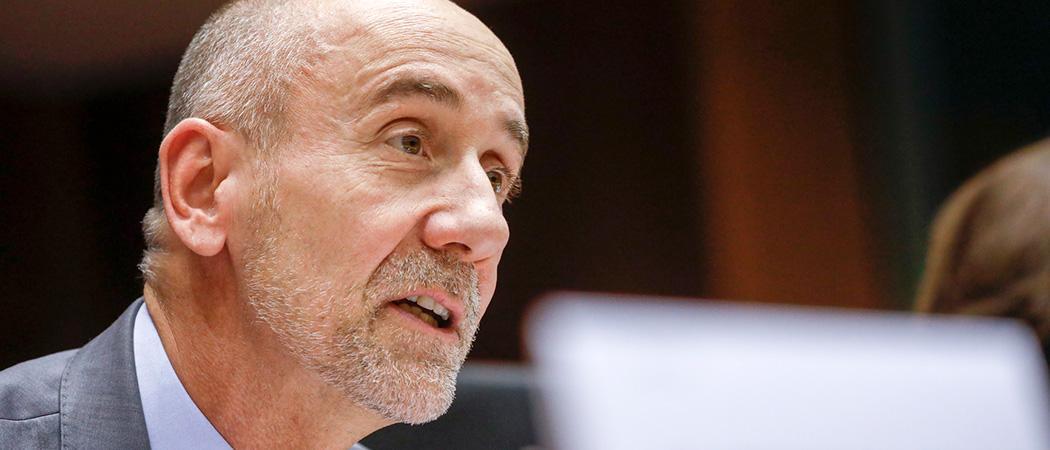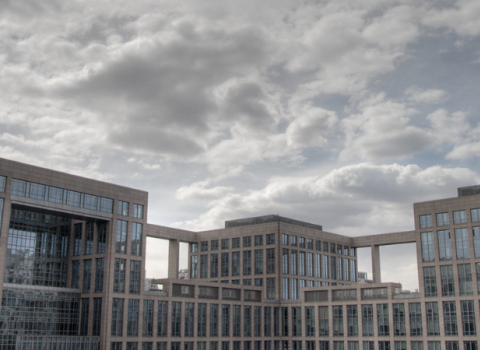In a swansong interview, Jean-Eric Paquet hails Horizon Europe and the rebooting of the European Research Area, but acknowledges more work is needed to get the European Innovation Council operating smoothly

Jean-Eric Paquet, head of the European Commission’s research directorate. Photo: European Union
After four years at the helm of the European Commission’s research directorate-general, Jean-Eric Paquet is now getting ready to become EU ambassador to Japan on 1 September.
Paquet has been steering the directorate-general since three months before the Commission published its proposal for the Horizon Europe programme. “I still had the opportunity to put finishing touches to it,” he said in a farewell interview with Science|Business.
In addition, Paquet helped spur a broader debate on how the EU coordinates research and innovation policy with member states under the new European Research Area (ERA), launched a much bigger widening programme for countries in central and eastern Europe with less developed research and innovation systems, and kickstarted a debate on the criteria for international science cooperation in the future.
As he prepares to move to Japan, Paquet says the rollout of Horizon Europe, the changes to its governance and the broader policy initiatives launched during his mandate are a success. But he acknowledges the European Innovation Council (EIC) remains “unfinished business.”
“It's true that the EIC is still to be consolidated,” he said. “We are now constructing it.”
After the Commission belatedly realised it did not have the expertise needed to manage the big pool of equity investments the EIC is due to make in high tech start-ups, it planned to hand over the management to the European Investment Bank (EIB). But after several months of delay, the architecture of the Fund remains to be finalised, largely because of internal tensions within the Commission, with the directorate general for budgets taking a risk-averse attitude to the equity investments that is said to be at odds with the research directorate’s vision for the EIC.
This has prompted the European Parliament to look into the delay. Horizon Europe co-rapporteur Christian Ehler gathered feedback in a bid to end the deadlock and subsequently filed a budget amendment to put in reserve the €811 million planned for the EIC Accelerator programme in 2023, until the Commission settles its internal disputes.
The Parliament wants the Commission to reassess the implementation of the EIC Fund and improve the management structure. It is recommending a new body should be set up by 2025 to take responsibility for implementation of the EIC Accelerator.
Paquet said the Commission is building on an “amazing first phase” in the EIC pilot that ran as part of the Horizon 2020 research programme. “We are now still constructing the final setup under Horizon Europe,” he said. Paquet views Parliament’s proposals as longer term fixes that would require another two years of debates and planning, and said the Commission will be able to iron out the remaining wrinkles in the next few months, allowing the EU to focus on scaling up cutting edge technologies more rapidly.
“I think it’s all good to say that this is not fast enough and that maybe we need something completely different, and the discussion still needs to take place between the Commission and the Parliament,” said Paquet. However, the proposals in the Parliament would put "another two years ahead of us and I don't think we shouldn't do that.”
Evolution not revolution
Before Paquet joined the research directorate-general, the Horizon Europe programme was pitched by the Commission not as a revolution, but as an evolution of Horizon 2020.
But with hindsight, “I think there is much more disruption in Horizon Europe than we said at the time,” Paquet said.
Among the novelties in the programme, Paquet pointed to the cross-cutting approach taken in Pillar II which is addressing global challenges and European industrial competitiveness; the overhaul of industrial partnerships; the creation of the EIC, and launching the research missions. “They are really deep changes,” he said.
Another notable advance was persuading the research directorate-general to share responsibility for Horizon Europe, with the whole of the Commission taking ownership and DG RTD coordinating the programme. The change in governance is making it possible to strike a balance between short, medium and long-term needs. “This co -creation of Horizon Europe is a total game changer, and I think we still haven't completely seen what this will mean over time,” Paquet said.
During his time in post, there has been intense debate about how much the EU should invest in research and innovation. In the early days of the Horizon Europe spending negotiations, a high-level group chaired by Pascal Lamy called for a budget of €160 billion. That figure was beaten down to €95.5 billion. Despite this, Paquet said in the face of broad constraints on the overall EU budget, the final agreement on Horizon Europe, “is a really good budget.”
As he notes, EU funding is complementary to national programmes and enables a higher level of international cooperation than can be achieved through bilateral programmes managed by member states. The added value of Horizon Europe is that it looks at “cross-cutting policy areas which are not dealt with at national level.”
Research organisations and associations should be “more demanding and critical” of member states and lobby them to invest better and more into basic research, said Paquet.
Beyond the horizon
Member states are now negotiating which of the 20 items on the ERA policy agenda they should coordinate on in the coming years. Building a single European research area is a long-held ambition that thus far has failed to translate to reality, but EU research commissioner Mariya Gabriel brought it back to life in the beginning of her mandate.
The goal is to push member states to implement reforms and coordinate national policies in research and innovation. A better coordinated policy field would allow the EU to improve research careers and mobility, spread excellence across regions and boost public and private R&D expenditure in lagging member states.
The policy failed in the past because there was no obligation on member states to implement it . Paquet said the research directorate-general was looking at creating a system similar to the European Semester, a system for coordinating economic and fiscal policies that member states are not able to ignore. The added value of such a similar construct for science would have been that member states were required to implement collective research policy decisions made at EU level.
“We are short of that because that's where we are politically,” said Paquet. “I think member states would have found it a bit too much.”
However, the outgoing director general said work going on under ERA will enable member states and EU institutions to “work hand-in-hand to reform and upgrade national systems,” on a voluntary basis.
A new global approach
Paquet’s mandate has confronted an ever-increasing number of global challenges. As with the rest of the world, the COVID-19 pandemic caught the EU on the hop. It had to scramble for basic medical supplies, like surgical masks and ventilators from China. Then the supply chain crisis set in train by the pandemic forced the EU to rethink the way it procures critical technologies, such as microchips, from other parts of the world.
Finally, among other fallout, the war in Ukraine is jeopardising Europe’s climate change goals, with calls in some quarters for coal to be substituted for gas in electricity generation, and raising the stakes in the race for renewable energy.
In the face of crisis after crisis, the EU has an ace up its sleeve. It continues to produce some of the best science in the world, a fact highlighted by the development of the mRNA technology that underpinned the rollout of a vaccine against SARS-CoV-2 less than a year after the pandemic broke out.
For Paquet, this triumph of European science leaves a bitter taste in the mouth. BioNTech, the German biotechnology company that co-developed the first approved mRNA vaccine (and which was first administered in the UK), did so after entering a partnership with the US pharmaceutical company Pfizer.
The world now knows the vaccine as Pfizer-BioNTech. Paquet says the EU should not have had let this happen. “I think the original sin is in the name of the vaccine,” he said. “The science behind the vaccine is 100% European, partly funded by the European Research Council and past framework programmes; the industrial deployment and production for Europe is 100% European,” he said.
Geopolitical tensions
Under Moedas the EU took an even more open approach to international science collaboration. But in the past few years the global context has shifted and the EU needed to respond. Last year, the Commission proposed a new global approach to international cooperation in research and innovation. Paquet says the document is “the right response” to the shifting geopolitical landscape. “Yes, we want to work globally, but there are minimum values and rules of engagement if you want reciprocity, which are critical to deploy science at global level,” he said.
There have been “Some very positive developments” in reshaping science relations with the US, but the EU is still working on a new cooperation setup with China. Meanwhile, joint projects with Russia have been cancelled, put on hold, or called into question following the invasion of Ukraine.
In Europe, Brussels is yet to reach agreement with Switzerland and the UK to allow the two countries to become associated to Horizon Europe.
On China, Paquet said the communist regime is occasionally a good partner, often a competitor, but also a systemic rival. Until now, EU-China relations relied on a simple philosophy. “We help a good partner develop its scientific capacity by thousands of students here in Europe, by teaming up in cutting edge research and sharing candidly the results.”
That is no longer an appropriate approach. “There is still space to host many very good academics here in Europe, this continues, but I think we need to be much less candid about it,” said Paquet. The Commission has published guidelines on foreign interference in EU research and encourages institutions to use that checklist when deciding whether they engage with Chinese partners or not.
The EU needs to be more forceful in demanding respect for values, reciprocity and intellectual property. China is not giving any very positive signals that it is willing to accept EU’s new rules. “We're not there yet,” said Paquet.





 A unique international forum for public research organisations and companies to connect their external engagement with strategic interests around their R&D system.
A unique international forum for public research organisations and companies to connect their external engagement with strategic interests around their R&D system.